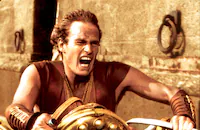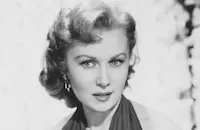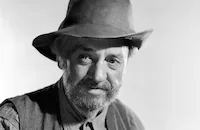Pony Express
Brief Synopsis
Cast & Crew
Jerry Hopper
Charlton Heston
Rhonda Fleming
Jan Sterling
Forrest Tucker
Michael Moore
Film Details
Technical Specs

Synopsis
In 1860, while riding along the southwestern prairie, federal scout William F. "Buffalo Bill" Cody is attacked by a band of Indians, who kill his horse. After Bill fends the warriors off with his sharpshooting, he hitches a ride with a passing stagecoach. The ever-glib Bill introduces himself to his fellow passengers, wealthy Californians Evelyn Hastings and her brother Rance, and after an uneasy ride, the stage stops at a way station. There, Red Barrett, a Cavalry sergeant, declares he is arresting Evelyn and Rance for advocating the secession of California, a treasonous offense. Suspicious, Bill surreptitiously checks out Red's horse and, discovering that both it and Red's rifle are not government issue, confronts the officer. A gunfight soon breaks out, and Bill chases off Red and his men. After coaxing a kiss out of Evelyn, Bill continues on to the next town and is greeted warmly by the tomboyish Denny Russell. Denny is immediately jealous of Evelyn, but Bill encourages the two to become friends. Bill then reunites with his old friend and partner Wild Bill Hickok, another sharpshooter. Later, in the hotel lobby, Evelyn and Rance confer with Joe Cooper, the owner of the Overland stageline. They and Cooper discuss Red's botched arrest, which they had concocted in the hope that it would lead to an uprising in California against the federal government. Along with Evelyn and Rance, Cooper, who knows that the creation of the Pony Express mail service by Bill, Hickok and Denny's father Russell will mean the end of his government mail contract, plots to eliminate the Express route's proposed way stations. Evelyn and Rance worry that if the Express is successful, it will appease Californians who are unhappy about being cut off from the nation's capital and ruin their secession scheme. In Russell's office, meanwhile, Bill and Hickok receive money from Russell to buy horses for the Express, which they have predicted will deliver mail from St. Joseph, Missouri, to Sacramento in ten days. Bill then persuades Denny to accompany Rance and Evelyn, whom he suspects of conspiring with a foreign government, while he and Hickok purchase horses from the Indians. Later, Bill and Hickok buy forty horses from the same Indians who earlier had attacked Bill, paying the tribe's chief, Yellow Hand, $800. Yellow Hand, who has long hated Bill, vows to fight him, and Bill knows that the Indians will use their cash to buy rifles. Sure that Cooper will sell them the firearms, Bill and Hickok ride to the next Overland depot. There, Bill sees Red, who is actually one of Cooper's teamsters, outside the depot and alerts Hickok to his presence. Red and Hickok face off, and Bill is forced to shoot Red to protect Hickok. Cooper and Rance and Evelyn, who have also arrived, accuse Bill of murdering Red. Before Bill is arrested, however, a reporter named Pemberton steps forward and supports Bill's version of the shooting. Cleared, Bill then warns Cooper about illegally selling guns to the Indians, then he and Hickok return to their herd. Soon after, however, they are confronted by rifle-wielding Indians and forced back to the depot. Bill, Hickok and Denny are joined by Rance and Evelyn in fighting the Indians, who encircle the depot. Suddenly, the Indians depart, and Bill makes plans to sneak out that night and set fire to the brush. Before dark, however, Yellow Hand re-appears at the depot, demanding that Bill fight him in exchange for the whites's safe passage. Although Bill is willing, Hickok persuades him to refuse, for the sake of the Express. Later, while Bill is getting some rest, Pemberton moves close to him while seeming to clean his gun. Sensing danger, Bill awakens and eyes Pemberton, who backs off. As planned, Bill slips out through a tunnel in the depot and steals an Indian's horse. Soon after, however, he is caught and brought to Yellow Hand, who angrily renews his duel offer. Fighting with a tomahawk, Bill kills Yellow Hand, and the surviving warriors retreat. While Bill and Hickok remain in the area to round up the scattered horses, Evelyn, Rance and Denny head for Fort Bridger on the stage. Later, Bill confronts Cooper about the gun sale, and Cooper tries to flee while shooting at Bill, but is himself shot and killed. In Fort Bridger, Evelyn, who has fallen in love with Bill, informs her brother that she wants no part of Pemberton, as she knows that he is a foreign agent sent to murder Bill. Intending to warn Bill, Evelyn remains in Fort Bridger while Rance and Pemberton continue to Sacramento. When Hickok and Bill show up, Evelyn informs them about Rance's plot to destroy the Express stations. Bill instructs Evelyn and Denny, who has donned a dress in an attempt to please him, to go to Sacramento and spy on Rance and Pemberton. In Sacramento, Evelyn lies to Rance that Bill rejected her romantically and she now wants revenge, and learns that Rance is expecting an important shipment. As soon as Bill and Hickok arrive in Sacramento with the horses, Rance, who has received some explosives, sets into motion his sabotage. At the same time, Russell orders the first Pony Express delivery, which includes California's anti-slavery proclamation, written in Washington, D.C. As the riders dash across the prairie, Bill and Hickok rush out to stop Rance. The three come head to head after Rance blows up a station, killing the Express rider, and during the ensuing gun battle, Hickok shoots Rance. Bill finishes the ride, arriving in Sacramento just as Pemberton is fomenting unrest among the townspeople. After presenting the proclamation, Bill settles the crowd, then confronts some snipers hired by Pemberton. Although Bill guns down the snipers and Pemberton, Denny is shot in the melee and later dies in Bill's arms. Grief-stricken, Bill gallops out of town and returns to the prairie.

Director

Jerry Hopper
Cast

Charlton Heston

Rhonda Fleming

Jan Sterling

Forrest Tucker
Michael Moore

Porter Hall
Richard Shannon

Henry Brandon
Stuart Randall
Lewis Martin
Pat Hogan
Eric Alden
Howard Joslin
Leroy Johnson
Jimmy H. Burk
Robert J. Miles
Bob Scott
Bob Templeton
Willard W. Willingham
John Mansfield
James Davies
Frank Wilcox
Len Hendry
Jerry James
Howard Gardiner
William Hamel
Charles Hamilton
Crew
Monroe W. Burbank
Sam Comer
Francisco Day
Farciot Edouart
Bertram Granger
Frank Gruber
Edith Head
Nat Holt
Clem Jones
Gene Merritt
Al Nozaki
Walter Oberst
Hal Pereira
Ray Rennahan
Paul Sawtell
Harry Templeton
Charles Marquis Warren
Eda Warren
Wally Westmore

Film Details
Technical Specs

Articles
Pony Express - Charlton Heston Stars in the 1953 Western PONY EXPRESS
Though the screenplay by Charles Marquis Warren (working from an original story by Frank Gruber) plays fast and loose with historical fact, Pony Express remains a fairly compelling piece of American frontier storytelling, with Heston's sagebrush savant and Tucker's more citified (and clean-shaven - the real Hickock grew his trademark handlebar moustache to hide a protuberant upper lip that got him branded "Duck Bill" Hickock) gunfighter taking a stand against sibling isolationists Rhonda Fleming and Michael Moore (Stalag 17), who want to foil the Pony Express and keep California from siding with the anti-slavery Union. Although directed by Jerry Hopper with a decided lack of urgency, Pony Express retains its currency half a century later in depicting a fractious nation torn between the efforts of forward-thinking progressives (including Jan Sterling as a prairie tomboy) and old school obstructionists (personified by dastardly Henry Brandon as a beetle-browed secondary villain and the more Albert Dekker-like Stuart Randall, whose outward show of gentility masks a blackly rapacious soul). Heston (fresh from King Vidor's Ruby Gentry) and Tucker share an easy rapport but the Cody-Hickock partnership bears surprisingly meager fruit given the titanic dimensions of their historical footprints.
Brought to DVD from the Paramount vaults by Olive Films, Pony Express looks very nice in its digital debut. The film's slightly-wider-than-standard aspect ratio (1.37:1) has been preserved on this Region 1 DVD and the transfer is both clean and pleasingly chromatic, with warm flesh tones and a satisfyingly variegated desert palate throughout. The monaural soundtrack is not very dynamic but acceptable and clear. There are no extras and Olive's keepcase art includes a bit of a spoiler for the film's disarmingly tragic conclusion.
For more information about Pony Express, visit Olive Films. To order Pony Express, go to TCM Shopping.
by Richard Harland Smith

Pony Express - Charlton Heston Stars in the 1953 Western PONY EXPRESS
Quotes
Trivia
Notes
The film concludes with the following quotation by Abraham Lincoln: "A grateful people acknowledges with pride its debt to the riders of the Pony Express. Their unfailing courage, their matchless stamina knitted together the ragged edges of a rising nation. Their achievement can only be equaled....never excelled." As depicted in the film, the Pony Express was inaugurated on April 3, 1860 in an effort to win the government mail contract away from the Butterfield Overland Mail stageline. Funded by the company of Russell, Majors and Waddell, the Express route ran from St. Joseph, MO, to Sacramento, CA. With way stations every ten miles, the route took thirteen days to ride (not ten, as depicted in the film). After the completion of the transcontinental telegraph, the Pony Express became obsolete and was shut down on October 24, 1861, after only eighteen months of service.
At age fourteen, long before he became well known, Buffalo Bill Cody rode for the Pony Express. Wild Bill Hickok, however, did not participate in any way in the service. For more information about Buffalo Bill, see the entry for the 1944 Twentieth Century-Fox release Buffalo Bill in the AFI Catalog of Feature Films, 1941-50. For more information about Wild Bill Hickok, see the entry for the 1937 Paramount release The Plainsman in the AFI Catalog of Feature Films, 1931-40.
According to a May 1952 ParNews item, Wendell Corey was to star in the film. Los Angeles Daily News news items reported that location shooting took place in Dixie, UT, near Kanab, and at other southern Utah sites. Shivwit, Piute, Navajo and Ute Indians were used as extras, according to Los Angeles Daily News. A Hollywood Reporter news item adds Slim Hightower to the cast, but his appearance in the final film has not been confirmed.














